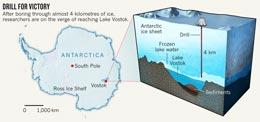Race against time for raiders of the lost lake
Arguably the most exciting — and certainly the most controversial — scientific endeavour in Antarctica's history is close to a breakthrough.
A Russian drilling team is just metres away from reaching the water surface of Lake Vostok, the largest and deepest of the freshwater lakes hidden beneath Antarctica's massive ice sheet.
The ambitious project, launched more than 20 years ago, has been repeatedly delayed by technical glitches and funding problems (see Nature 464, 472–473; 2010). But Russian researchers, who on 2 January resumed drilling at a depth of 3,650 metres, believe that just 20–40 metres or so of accretion ice — frozen lake water — now separate them from the lake's liquid surface. "We can make it this time," Valery Lukin, director of the Russian Antarctic programme, told Nature.
But time is short. Although the drill can advance by about 3 metres each day, the team must call a halt by 6 February, when the last aircraft of the summer research season is due to leave the Vostok research station, about 1,300 kilometres from the South Pole (see 'Drill for victory'). If they haven't reached the lake by then, they will have to wait until December to continue, Lukin says.
The chance of sampling one of the last uncharted environments on Earth has excited researchers ever since the lake's existence was first mooted in the 1970s. Many are thrilled by the possibility of discovering evidence of unique life forms in the lake, which is thought to have formed as much as 35 million years ago. But others worry that the drilling effort could contaminate an untouched environment. The lake may hold traces of ancient microorganisms that could reveal how life on Earth has adapted to extreme conditions.
At the Vostok station, tension is rising with every passing day. The team hopes that a sensor attached to the drill head will signal contact with liquid water in the next few weeks. At that point, the drill will be stopped and extracted from the bore hole, thereby lowering the pressure beneath it and drawing water into the hole. This should prevent any of the silicone drilling lubricant from entering the lake, explains Lukin. The rising water will rapidly freeze in the borehole, where drillers can extract it without penetrating the pristine lake. "If everything goes according to plan, we will re-core the hole in December and retrieve the frozen sample without polluting the lake water," he says.
“This is as new and exciting as flying to Mars.”
The plan cleared a key hurdle last November, when scientists with Russia's Arctic and Antarctic Research Institute (AARI) in St Petersburg submitted a final environmental evaluation of the project, approved by the Russian government, to the Antarctic Treaty's environmental protection committee. The document addresses queries or objections previously raised by parties to the treaty, allowing sampling operations to begin 60 days after the final evaluation was circulated to them. Scientists contacted by Nature acknowledge Russia's right to proceed as planned, but remain unconvinced that the sampling technology is as clean as is claimed. "From our experience there is no such thing as clean drilling," says Jean Robert Petit, a glaciologist at the Laboratory of Glaciology and Environmental Geophysics (LGGE) near Grenoble in France.
Lake Vostok has been totally isolated for almost 15 million years, and researchers suspect that it is virtually devoid of nutrients and organic carbon. Its chemistry, together with the cold, darkness and high water pressure, could mean that conditions there resemble those in the suspected ice-covered ocean on Jupiter's moon Europa. Many think that Lake Vostok's water is unlikely to support life today, but that the sediment or bedrock beneath might host microorganisms. That would feed hopes that something similar could be found on Europa.
Sediments found in accretion ice extracted in previous years by a team from the LGGE contained the thermophilic bacterium Hydrogenophilus thermoluteolus (S. A. Bulat et al. Adv. Space Res. doi:10.1016/j.asr.2010.11.024; 2010), although this does not prove that there is life in the lake itself.
If the Russians reach their goal, lake water samples will be analysed for genetic material at the AARI, where a state-of-the-art DNA sampling laboratory opened last November, says Lukin. The credibility of any findings will require meticulously documented decontamination procedures, says Martin Siegert, an Antarctic researcher at the University of Edinburgh, UK. "Scientists will rightly ask how contamination has been avoided, for example during the ice core's long journey up the borehole," he says. Lukin says that any traces of life found will be sent to foreign labs for independent verification. "We are prepared to do this properly."
Meanwhile, Russian scientists and engineers are laying plans to venture into the lake itself. In the Antarctic summer of 2012–13, they plan to send a swimming robot into the lake to collect water samples and sediments from the bottom. An environmental assessment of the plan will be submitted at the Antarctic Treaty's consultative meeting in May 2012. "We'd like to pursue this by all means," says Lukin. "For us, this is as new and exciting as flying to Mars."

No comments:
Post a Comment